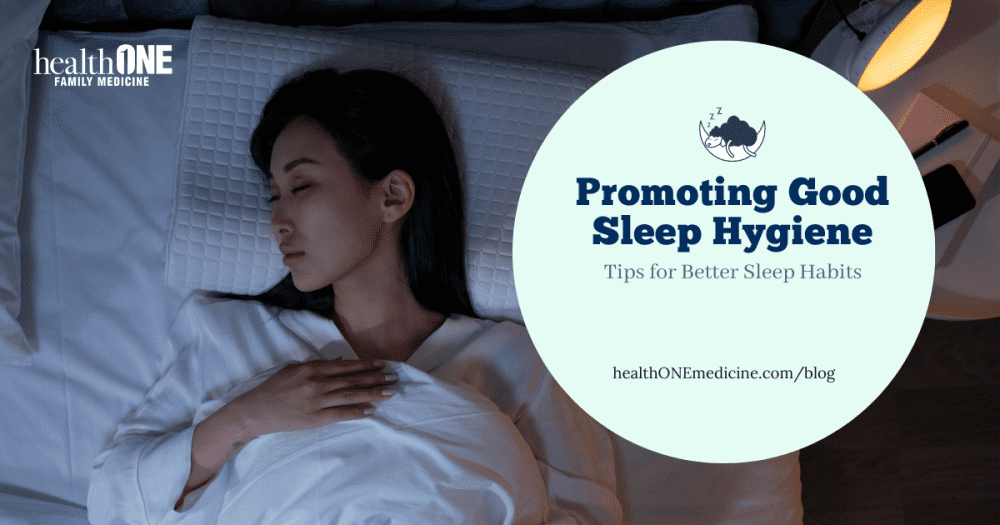Quality sleep is essential for our overall health and well-being, yet many people struggle with sleep-related issues. Promoting good sleep hygiene involves adopting healthy habits and creating an ideal sleep environment to improve the quantity and quality of sleep.
Even if you are not having trouble sleeping, it is crucial to adopt sound sleep habits since they foster your overall well-being.
Now let’s explore sleep hygiene and understand how it can positively impact your sleep health.
What is Sleep Hygiene?
Sleep hygiene refers to a set of practices and habits that can help you sleep better. Following these guidelines allows you to establish a conducive sleep environment and adopt behaviors that enhance your ability to fall asleep and maintain restful sleep throughout the night.
Tips for Better Sleep Hygiene
The following are some tips and tricks that can improve your sleep hygiene:
Stick to a Regular Sleep Schedule
Establish a regular sleep schedule by going to bed and waking up at the same time every day. This influences your body’s internal clock and ensures improved sleep quality. Avoid staying up late or sleeping in excessively, as this can disrupt your sleep-wake cycle.
Develop a Sleep-Friendly Environment
Ideally, your room should be quiet and dark. Many people like using blackout curtains or eye shades to avoid any light seeping in. Earplugs or white noise machines are good options to minimize noise. Also, make sure to adjust the temperature to a comfortable level before hitting the bed. You can consider using a fan or a humidifier to regulate airflow and create a soothing atmosphere.
Establish a Pre-Sleep Routine
A relaxing routine before bedtime can be very helpful. A consistent routine triggers your body and signals that it’s time to rest. Some calming activities to engage in include reading a book, taking a nice and long warm bath, trying relaxation techniques like meditation, or simply listening to soothing music.
Avoid Using Stimulants and Electronics
Avoid consuming stimulants like caffeine, alcohol or nicotine close to bedtime. These substances can disrupt your ability to fall and stay asleep, causing you to toss and turn for long hours.
Additionally, minimize exposure to electronic devices with blue light, such as smartphones and tablets, before bed. The blue light can suppress the production of melatonin, a hormone that helps regulate sleep.
Create a Comfortable Sleep Environment
Invest in a soft and comfortable bed, mattress, and pillow that can support your body and promote proper alignment. Choose sleepwear that allows for optimal temperature regulation and reduces any discomfort. Keep the bedroom clean, clutter-free, and well-ventilated to create a relaxing and inviting sleep environment.
Exercise Regularly
Engaging in regular physical activity can improve sleep quality. Exercise helps reduce stress and anxiety, which are common culprits of sleep disturbances. Thirty minutes of moderate-intensity exercise three to four times a week can benefit your physical and mental health.
That said, it is best to avoid exercising right before bedtime as it can increase alertness and make it difficult to fall asleep.
Avoid Heavy Meals and Fluid Intake Before Bed
Refrain from consuming heavy meals or large amounts of fluids close to bedtime. Heavy meals can cause discomfort and digestive issues, which can make it difficult to fall asleep.
Ideally, you should have a light meal in the evening, at least two to three hours before bedtime. If you are thirsty before bed, take small sips of water rather than large amounts.
When to Seek Professional Help
While adopting good sleep hygiene practices can help improve your sleep quality, persistent sleep difficulties may require professional intervention. You should seek help from a healthcare provider or sleep specialist if:
- You regularly struggle with falling asleep or staying asleep, experiencing insomnia-like symptoms that persist for more than a few weeks.
- You experience excessive daytime sleepiness or fatigue that affects your daily functioning and quality of life.
- Your sleep difficulties persist despite making changes to your sleep habits and environment.
- You suspect you may have a sleeping disorder, such as insomnia, sleep apnea, or restless legs syndrome.
- You have concerns about the quality or quantity of your sleep and its impact on your overall health.
A healthcare professional can conduct a thorough evaluation, provide an accurate diagnosis, and recommend appropriate treatment options tailored to your specific needs. This may involve further sleep assessments, overnight sleep studies, or referrals to specialists if necessary.
Wrapping Up
Promoting good sleep hygiene is essential for a restful and rejuvenating sleep. Remember, everyone’s sleep needs may vary, so it is important to experiment and find what works best for you. You should prioritize sleep hygiene as a vital component of your self-care routine.
Enjoy the benefits of a good night’s rest for optimal health and vitality by consulting a professional at https://healthonemedicine.com/


Rattling excellent info can be found on web site.Raise range